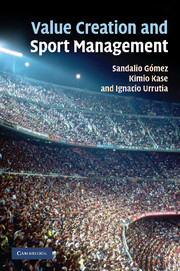Book contents
- Frontmatter
- Dedication
- Contents
- List of figures
- List of tables
- List of contributing authors
- Foreword
- Introduction
- 1 The virtuous circle of value creation in the sports industry
- 2 Value creation and performance criteria for sport entities
- 3 National context and profit strategy of the sport entity
- 4 Value creation in two of the most prestigious Spanish football clubs
- 5 The proto-image of Real Madrid
- 6 Value creation from the organizational structure of a sports entity
- Appendix I Why NGOs matter for the success of sporting events
- Appendix II Strategic evaluation of sponsorship and patronage
- Appendix III Structural characteristics of sport organizations
- Index
- References
Appendix I - Why NGOs matter for the success of sporting events
the case of the America's Cup
Published online by Cambridge University Press: 05 February 2014
- Frontmatter
- Dedication
- Contents
- List of figures
- List of tables
- List of contributing authors
- Foreword
- Introduction
- 1 The virtuous circle of value creation in the sports industry
- 2 Value creation and performance criteria for sport entities
- 3 National context and profit strategy of the sport entity
- 4 Value creation in two of the most prestigious Spanish football clubs
- 5 The proto-image of Real Madrid
- 6 Value creation from the organizational structure of a sports entity
- Appendix I Why NGOs matter for the success of sporting events
- Appendix II Strategic evaluation of sponsorship and patronage
- Appendix III Structural characteristics of sport organizations
- Index
- References
Summary
Activist NGOs are the shock troops of the Civil Society.
(SustainAbility UN Global Compact, 2003)Introduction
The role of NGOs (non-governmental organizations) in the success of sport events is analysed in the light of their relevance to other stakeholders in the events. The assumptions on which the analysis is based are twofold: first, the professionalization of sport events requiring the participation of NGOs, and, second, with the consumers being increasingly more reactive to the events, proactive players such as NGOs are needed to capture value forces. On the basis of these assumptions, the hypothesis that the NGO activists’ behaviour has become a better indicator of the success or failure of sport events is verified by the examination of the 32nd America's Cup.
Much of the literature about corporate social responsibility (CSR) and sporting events is suffused with cause-related marketing (CRM). Little has been done, however, to foster CSR in terms of stakeholder analysis. The aim of this appendix is to consider the benefits of considering non-governmental organizations (NGOs) as key drivers in the success of not only the sporting event but also the success of the other stakeholders in the ‘orbit’ of that event – these stakeholders may include citizens, the city, the sponsors, and even other related sport events. In short, our aim is to show that the benefits stemming from a connection to the NGOs’ behaviours are also conferred upon the sporting event and all its stakeholders.
- Type
- Chapter
- Information
- Value Creation and Sport Management , pp. 209 - 219Publisher: Cambridge University PressPrint publication year: 2010



